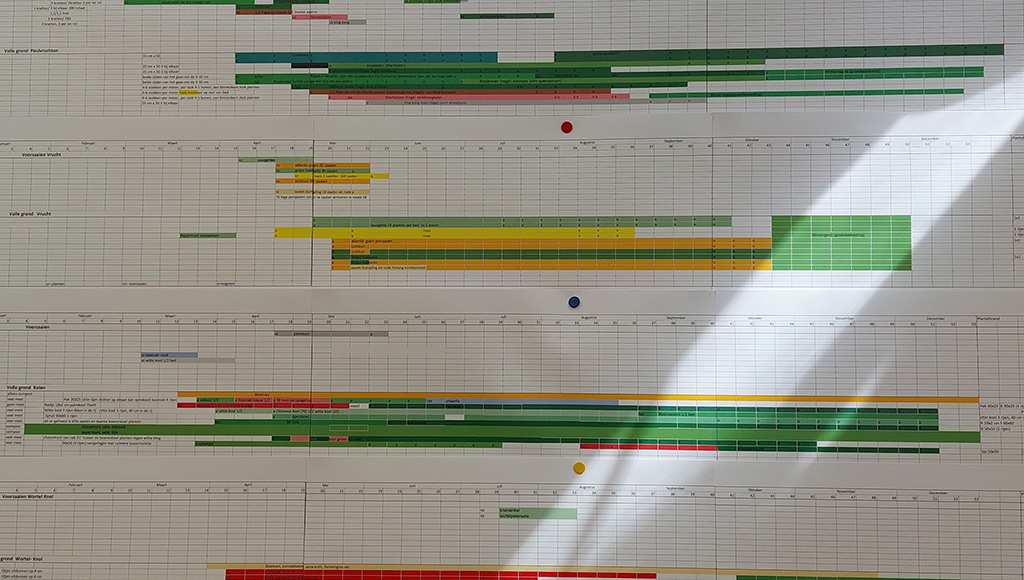On 14 May 2024 I had the pleasure of showing Tiago Sá Gomes and Bárbara Arita from the Lisbon-based NGO Upfarming, and Jean-marc Louvin of ICLEI around the Utrecht city garden Food For Good.
Upfarming promotes food literacy, community development, participatory ecology and well-being in cities through implementing holistic urban agriculture projects. Their approach combines the productivity of vertical agriculture with the therapeutic benefits of community vegetable gardens, composting and agroforestry, in order to create new spaces for meeting, debating, sharing and living together in the heart of cities.
ICLEI is a global network of more than 2500 local and regional governments committed to sustainable urban development whose aim is to make sustainability an integral part of urban development and to create systemic change in urban areas through practical, integrated solutions.
The group were visiting Food For Good as participants in the Horizon Europe Research and Innovation Programme funded CULTIVATE Project, developer of the Food Sharing Compass. From the website:
In a world experiencing continuous and unexpected changes, urban and peri-urban (UPU) food systems are replete with inequities and inequalities that make them fragile and vulnerable to shocks. An urgent transition towards more just and sustainable food systems is required.
Many FSIs already contribute towards this transition yet their activities are often hampered by complex, fragmented food governance, uncertain finance, and insecure tenure.
Through the Food Sharing Compass CULTIVATE addresses the problem, helping cities navigate towards resilient and sustainable food sharing. The project identifies drivers and implementation gaps, and challenges existing theories and practices which currently constrain food sharing.
CULTIVATE builds upon a previous ERC funded SHARECITY Project. SHARECITY aimed to improve understanding of how, why and to what end people share food within cities in the 21st Century, in order to establish the significance and potential of food sharing economies to transform cities towards more sustainable pathways by developing deeper theoretical understanding of contemporary food sharing. The project generates comparative international empirical data about food sharing activities within cities, assessing their impact and exploring how food sharing in cities might evolve in the future.
From the website:
With planetary urbanization fast approaching there is growing clarity regarding the un-sustainability of cities, not least with respect to food consumption. Sharing, including food sharing, is increasingly being identified as one transformative mechanism for sustainable cities: reducing consumption; conserving resources, preventing waste and providing new forms of socio-economic relations. However, such claims currently rest on thin conceptual and empirical foundations.
Utrecht is a hub city for CULTIVATE and the host team had organized for all of the partners to come and learn more about the city. The group had a visit planned to Rijnvliet, the flagship ‘edible suburb’ that I have previously visited and written about, so I tagged along.
It was as this visit unfolded that a network of connections was revealed that tie Responsible Innovation and the Bassetti Foundation to urban food provisioning research.
The CULTIVATE project coordinator Anna Davies was also Principle Investigator of the SHARECITY. In 2020 she shared a panel at the EuroScience Open Forum: ESOF 2020 with long-time Foundation collaborator Cristina Grasseni, who presented her own ERC research project Food Citizens? Collective Food Procurement in European Cities: Solidarity and Diversity, Skills and Scale.
As we browsed the SHARECITY website before the tour began I saw another familiar face, that of Oona Morrow. Oona had been a post-doctorate researcher on the project, and had collaborated closely with Grasseni during her own research in Massachusetts. I had also met her during the SAGE conference that I reported on here, where Grasseni presented her Beyond Alternative Food Networks book.
This moment in time of shared research clearly shows up in the SHARECITY website. In the database of food sharing activities I found Bootstrap Compost, a Cambridge (MA) start up whose launch party I attended in 2011 on behalf of the Foundation, and the League of Urban Canners, a group specialized in harvesting and preserving fruit growing in the city, to whom we donated our family bicycle and trailer upon our return to Europe in 2014.
Milan City Council, the initiator of the Milan Urban Food Policy Pact on occasion of the Milan EXPO of 2016 (themed on sustainable food), is also a hub city in the project – and as we chatted in the Rijnvliet food forest it turned out that one of their represenatives Matteo Matteini had knowledge of the Foundation and had met General Secretary Francesco Samorè. As regular readers may know, the Bassetti Foundation has close ties to the City council and we have collaborated many times throughout our 30 year history.
The Milan connection continued as I was preparing to write this little piece, as I discovered that Ilaria Bonetti with whom the Foundation had collaborated on the EU Interreg ROSIE project (for which I was external RI expert) is now working at ICONS, an innovation strategist and horizontal partner in CULTIVATE.
What I take home is that a vast but tight-knit global network of researchers, policy-makers, entrepreneurs and activists diversely pursues the idea that food systems are a starting point to develop responsible strategies for innovating not only the food system, but communities and urban environments. The fact that I find around me, in Utrecht, people connecting on this topic from Portugal and Ireland, with others that I had already met in Boston and Milan, confirms my thinking about Responsible Innovation as a matter of relevance to local food provisioning and vice versa, as argued with Cristina Grasseni in this 2014 article for the journal Glocalism. It’s possible that a broader scholarly network than that of RRI is de facto following an RI approach and that their on-going results have become part of how they articulate recommendations for lifestyle change and next-system transition.
















